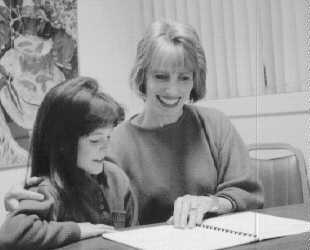 Melody
Allen Lenkner, M.A., CCC-SLP
Melody
Allen Lenkner, M.A., CCC-SLP
Clinic Coordinator, Scottish Rite Learning Clinic
 Melody
Allen Lenkner, M.A., CCC-SLP
Melody
Allen Lenkner, M.A., CCC-SLP
Clinic Coordinator, Scottish Rite Learning Clinic
Tom's mother called the other day. Her son received an interdisciplinary assessment from the Twin Falls Learning Clinic about a year and a half ago. As a result of the assessment, he had been diagnosed as having a language problem, Attention Deficit/Hyperactivity Disorder (AD/HD) and depression. We assisted the family to obtain language therapy and appropriate counseling and medication for his depression and AD/HD. With this assistance, Tom did well in school.
But, as I said, Tom's mother called the other day. Tom entered junior high this year and has started the year very poorly. He has been in detention almost every afternoon, is already failing one class, and is resisting going to school. What happened? A number of things. The family has been struggling financially and dropped out of counseling, switched to a cheaper medication which has since been found not to be effective, and the academic assistance that Tom had been receiving in elementary school had not been put in place yet.
This scenario represents two often overlooked but very important aspects of learning disabilities and AD/HD. The first aspect is that these conditions are lifelong. They are caused by different neurological "wiring" and neurochemical interactions in the brain and, as such, cannot be "cured." Rather, they are compensated for by special teaching, self-knowledge, medication sometimes, and a lot of hard work.
The second aspect is that these conditions usually require intervention which is multi-faceted, often crossing a number of disciplines and environments. Children with these disabilities are like three-legged stools -- they require all three legs in order to remain stable. The loss of any one leg causes collapse.
Melody Allen Lenkner works with a student at the
Scottish Rite Learning Clinic in Twin Falls, Idaho.
Because we know these facts, the Scottish Rite Learning Clinic in Twin Falls, Idaho, offers case management as one of its primary services. With this service, we commit to assisting each parent to understand his/her child's individual needs and to access the appropriate services for their child within the community. Following this, we remain available to the family until the child is 21 or graduates from college. In Tom's case, we were able to advocate with the school to get him into counseling and to have a meeting to institute appropriate academic accommodations in a more timely manner than would have normally occurred. At the same time, we worked with a local psychiatrist to obtain a payment plan so that Tom could once again receive appropriate medications.
Getting the correct diagnosis is just the first step in meeting the
needs of children with learning differences and AD/HD. Just like the many
dedicated parents that we work with, The Scottish Rite Childhood Language
Disorder Program is committed to these children over the "long haul."
Please remember The Scottish Rite Foundation, S.J., USA, with your gifts and in your will. 1-800-486-3331